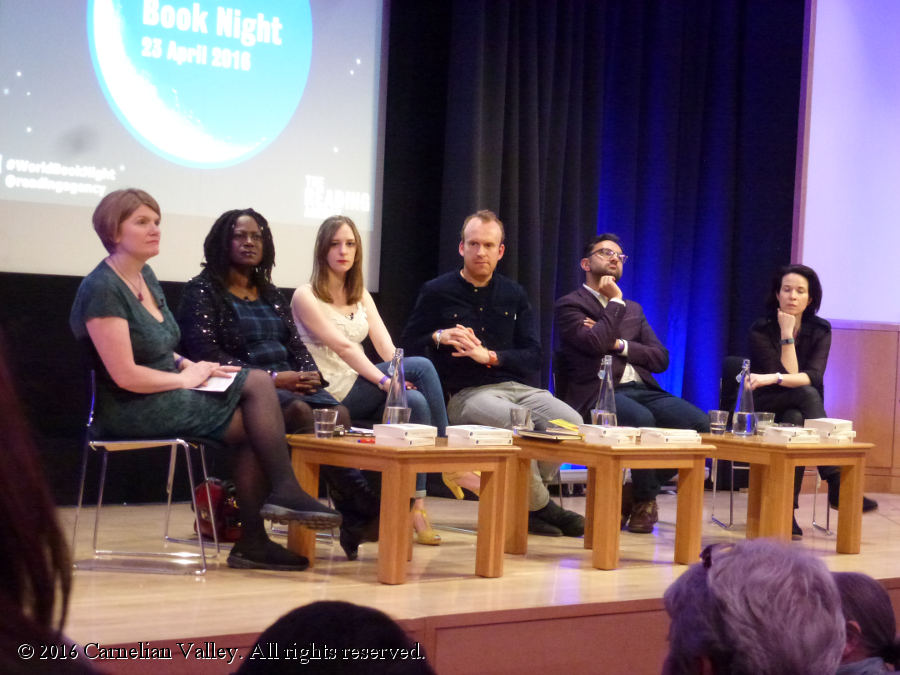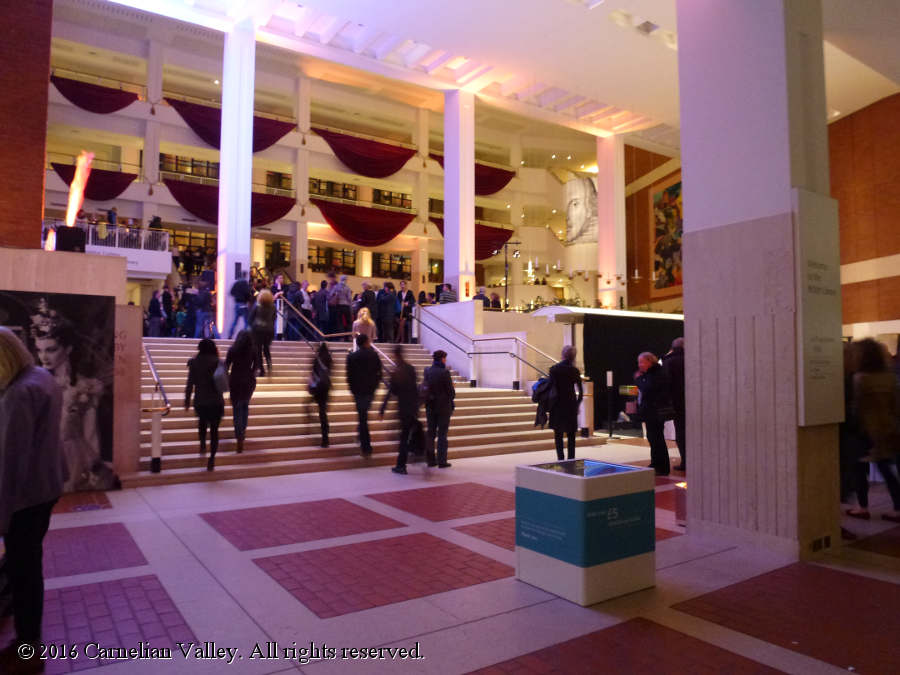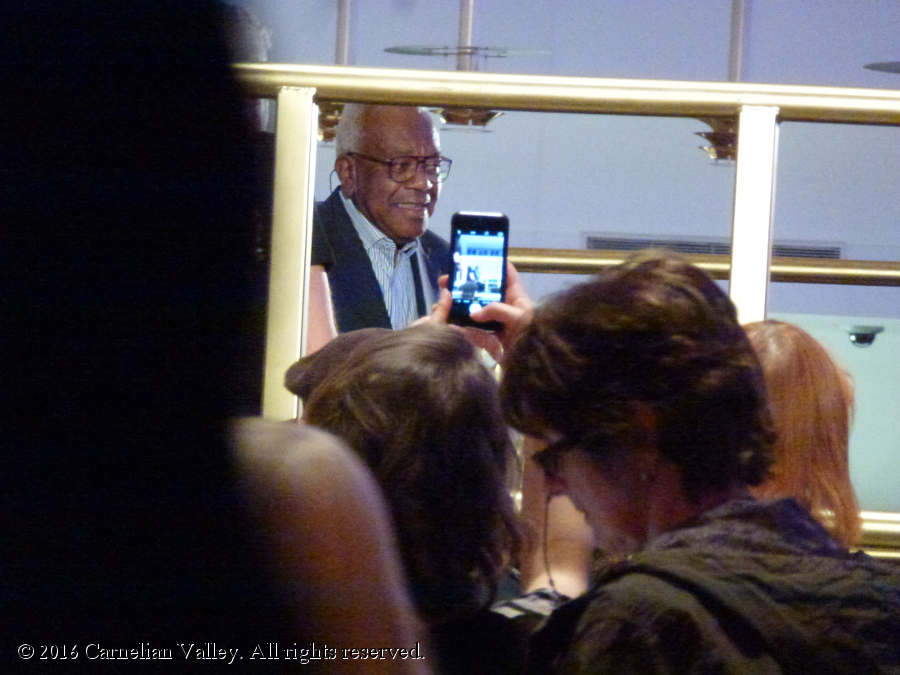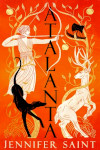World Book Night 2016
Posted 29th April 2016
Category: Events Genres: N/A
5 Comments

“I think I’m on a list,” I said to the woman on the door. It was one of my first times on a list for a public event and I wanted to notify her in case the ticket desk wasn’t the one I’d need, without sounding pretentious. Yes, I was over-thinking it.
Here we were at the British Library Conference Centre for the World Book Night gala event. It was pretty packed.
Roly Keating, who I expect finds lots of people asking if he knows of the pop star with the very similar name, welcomed us to the event. He’s the Chief Executive of the Library and told us, in reference to the whole Shakespeare celebration (it’s the 400th anniversary of the Bard, his birthday and death day being the same date) “we’re going to party like it’s 1616”.
Not straight away, though – Sue Wilkinson, Chief Executive of The Reading Agency, introduced us to the night’s proceedings and to the panel of authors about to take to the stage. She spoke of the charity and of reading in general, the mission of the Agency. “Libraries aid us all our lives… we believe everything changes when you read.”
It was the goal of those who created World Book Night to get thousands of people who’d never read a book before to read one then, to be inspired and to pass their book on to another who could also benefit. Research shows World Book Night does get people reading: 85% of the 5000 surveyed, who’d never read before, said they’d kept on reading afterwards.
The panel consisted of Cathy Rentzenbrink as chair, Dreda Say Mitchell, Holly Bourne, Matt Haig, Sathnam Sanghera, and S J Parris. Dreda gave a brief introduction to east London, her home, saying how it doesn’t fit the stereotype, that it’s full of culture. There weren’t books in her childhood home because there didn’t need to be – there were plenty of good libraries, an art gallery, and Dreda and her siblings would visit them all, their parents not always in the know. Her first favourite books were the Topsy And Tim series and the scratch and sniff books of yore.
Dreda does a lot of prison work. 50% of people in prison have poor literacy skills. “Reading opens doors for you… if only so much [money] was spent on reading,” she said.
For Holly, reading helped make sense of life. She called it both an escape and a hallucinogenic drug. She didn’t see how hard life was where she grew up because her face was always in a book. Her love for reading dipped in secondary school due to the requirement for exams on things she loved. Her first poem, the first she liked, was a Philip Larkin – she liked the use of the F word. “You can’t find poetry,” she said of her late development in it, “poetry has to find you“.
Matt remembers reading tractor catalogues in his younger years; he had dreams of working with them. Similarly to Holly he said, “school distanced me from that pure joy for a while”. He came back to books at 13, reading The Outsiders. Then, suffering from depression and anxiety, he got back to his childhood favourites, minus the tractor catalogue. He said reading had been his only escape from himself. “Stories are about change,” he said. The good thing about his issues, he jested, particularly the agoraphobia, was that it narrowed down his career options.
Sathnam’s father was illiterate but took his children to the library. As a child the author became obsessed by the idea of owning a book and bought a nice copy of the collective works of George Orwell. He was too young to understand it but enjoyed pretending he’d read it when his cousins came from miles away to see it. He still hasn’t read it.
In regards to his own work: “If your parents don’t read books you can write anything you want about them”. Much laughter. Most people he knows just want to know when there’ll be a TV adaptation. Ending on an ironic note, he told us he’d failed the audition for his own audiobook.
S J Parris – Stephanie Merritt – grew up in a house full of books because neither parent had had books as children. She was very young when she picked up her first non-picture book, one of The Famous Five, and thought the chapters inferred it was a short story collection. The book she read to us from, A Christmas Carol, she first attempted aged 10.

We moved on to Shakespeare. Stephanie said she’d had a great English teacher who had made a bet with her to read the Bard’s complete works by the end of her GCSEs. She read most of them. “A bad adaptation is the worst thing in the world, a good one the best,” said Sathnam. Teachers need to be aware that it’s hard for kids, he said, they need to break the text up. Matt spoke of how there’s wisdom in Othello and Hamlet about mental health – it’s as though Shakespeare invented Cognitive Behavioural Therapy; it’s hard to read the plays and not see the writer’s depression.
Holly’s introduction was via Keanu Reeves – she didn’t need to understand it. Matt mentioned the Leonard Di Caprio Romeo And Juliet – yes, she liked that, too. School put her off but she’s interested again; she spoke of Shakespeare being 400 years ahead of his time in the way he approached gender, treated women, and said he showed there was more to women than was thought at the time. She loved that he invented the words ‘eyeball’ and ‘lonely’. What did we do without the word ‘lonely’?
Dreda said what by now we were all thinking – Shakespeare’s taught badly. She had a teacher who emphasised performance and spoke of how her class had been enthralled by Judi Dench saying ‘unsex me now’. If you get a good production you can really draw kids in, she said. He’s writing about things we like, what we watch on TV.
What books would the authors give away? Dreda chose The Colour Purple, Holly To Kill A Mockingbird, Matt The Outsiders and The Cosmos. Cathy said she’d give away Matt’s book and has done previously, saying it illustrates how reading makes you feel less alone.
After this we all went into the main lobby of the library, joining many others, to view the exhibitions on Shakespeare through the ages. There were primary sources involved, so no photographs, but along with the original texts there was Vivian Leigh’s Lady Macbeth costume, and a room dedicated to black actors playing Othello (the first in Britain acted in 1925… it’s not like Othello was written to be a black man, after all…). There was also the last draft of one of Angela Carter’s books.
Here’s a grainy photo of Sir Trevor Macdonald. I was too busy trying to take it to really listen…

I forgot that June Brown was Dot Cotton from Eastenders so I missed half her set. She was speaking of her Shakespeare plays, how she’d been taught to keep thinking to rehearsals and not think when performing. She said she’d speak all night if she could and that she’d once interpreted a spotlight on her as encouragement to go on when it was actually a hint for her to stop talking. Here a glass broke somewhere downstairs in the bar area and she shouted at them to stop making so much noise when she was on stage. I remember seeing her drunk on Graham Norton’s show alongside Lady Gaga and thought she was funny; seems she’s funny all the time. I suppose one has to be when they work on Eastenders…
Having never done anything for World Book Night before because I always miss the date, it was a super first innings. Thank you, Alice, for inviting me.
What did you do on World Book Night? (I’m assuming most of you were very appropriately Readathoning!)
April 29, 2016, 2:39 pm
An amazing concept, and this WBN event sounds wonderful. Sadly, not something I participated in as I had hoped I would this year. Still, the event I had hoped to attend got some terrific feedback.
May 2, 2016, 8:07 pm
What a wonderful event :D sounds like you really enjoyed it. I actually did nothing to mark the event because I completely forgot about it haha. I need to keep a calender of all the bookie things that happen throughout the year.
May 24, 2016, 9:53 am
April: Agreed. Lady Gaga was outmatched ;)
‘I bought three books today, because I went into Waterstones.’ – That’s the situation exactly! A good thought, knowing yourself and reflecting. It’s kind of ironic to say but there’s only so much you can learn from living something; some things you can only get details from books.
Tracy: I think you gave out some books in a way? Glad to hear about your event; here’s hoping there will be another!
Stefanie: :)
Alice: Yes; it was quite different to what I thought it might be but not at all in a bad way. I’ve thought of a calendar every year… then I remember just how many festivals there are to keep track of/decide if they’re a possibility…
5 Comments
Comments closed























April 29, 2016, 2:18 pm
I don’t watch Graham Norton very often, but I saw that one. June Brown was brilliant, Lady Gaga wasn’t.
In my head I know that there are people who don’t read books, but I can’t imagine what that must be like. My mum devoured books from the library, so we did too. I have piles of books on the bedroom floor because I can’t bear to part with my old friends. I bought three books today, because I went into Waterstones. How can you know yourself if you can’t reflect on the world through a book?